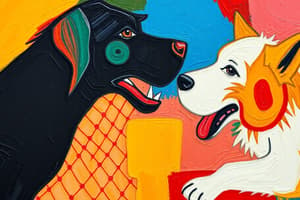Podcast
Questions and Answers
What is Pavlov known for?
What is Pavlov known for?
- Formulating the law of gravitation
- Inventing the telephone
- Behaviorist-Classically conditioned dogs to salivate at the sound of a bell (correct)
- Developing the theory of relativity
What is an unconditioned stimulus?
What is an unconditioned stimulus?
A stimulus that evokes an unconditioned response without previous conditioning.
What is an unconditioned response?
What is an unconditioned response?
The unlearned, naturally occurring response to the unconditioned stimulus.
What is a conditioned stimulus?
What is a conditioned stimulus?
What is a conditioned response?
What is a conditioned response?
What does 'higher order' refer to in conditioning?
What does 'higher order' refer to in conditioning?
What is taste aversion?
What is taste aversion?
What is generalization in classical conditioning?
What is generalization in classical conditioning?
What is discrimination in classical conditioning?
What is discrimination in classical conditioning?
What is acquisition in classical conditioning?
What is acquisition in classical conditioning?
What is extinction in classical conditioning?
What is extinction in classical conditioning?
What is the inter stimulus interval?
What is the inter stimulus interval?
What is spontaneous recovery?
What is spontaneous recovery?
Flashcards are hidden until you start studying
Study Notes
Classical Conditioning Concepts
- Pavlov: A prominent behaviorist known for his experiments with dogs, demonstrating classical conditioning by making them salivate at the sound of a bell.
- Unconditioned Stimulus (US): A naturally occurring stimulus that elicits an unconditioned response without prior conditioning, such as food causing salivation.
- Unconditioned Response (UR): The automatic, natural reaction to an unconditioned stimulus, exemplified by salivation in response to food in the mouth.
- Conditioned Stimulus (CS): An initially neutral stimulus that, when paired with an unconditioned stimulus, eventually triggers a conditioned response, such as a bell sound.
- Conditioned Response (CR): The learned reaction to a conditioned stimulus, which occurs after conditioning, like dogs salivating at the sound of the bell.
- Higher Order Conditioning: Introducing an additional neutral stimulus that becomes associated with the conditioned stimulus, enabling the conditioned response to occur in response to the new stimulus, for instance, a flash of light preceding the bell.
- Taste Aversion: A specific learned behavior where individuals develop a strong aversion toward particular foods, often due to a negative experience (e.g., illness).
- Generalization: Drawing broader conclusions based on specific examples or experiences, often leading to similar responses to stimuli that resemble the original conditioned stimulus.
- Discrimination: The ability to distinguish between a conditioned stimulus and other stimuli that do not signal an unconditioned stimulus, enhancing specificity in responses.
- Acquisition: The initial phase in classical conditioning where a neutral stimulus is linked with an unconditioned stimulus, starting to elicit a conditioned response; also relates to strengthening responses in operant conditioning.
- Extinction: The process whereby a conditioned response diminishes over time when the conditioned stimulus is repeatedly presented without the unconditioned stimulus.
- Interstimulus Interval: The time gap between the presentation of the conditioned stimulus and the unconditioned stimulus, critical for effective conditioning.
- Spontaneous Recovery: The phenomenon where a previously extinguished conditioned response reappears after a pause, indicating that conditioning effects may linger.
Studying That Suits You
Use AI to generate personalized quizzes and flashcards to suit your learning preferences.




